Munich is both the capital and the largest city in the southern German state of Bavaria. It is located in the south-eastern part of the country not far from the border with Austria.
In fact, the Tyrolean capital of Innsbruck is much closer to Munich (150 kilometres) than Berlin (590 kilometres).
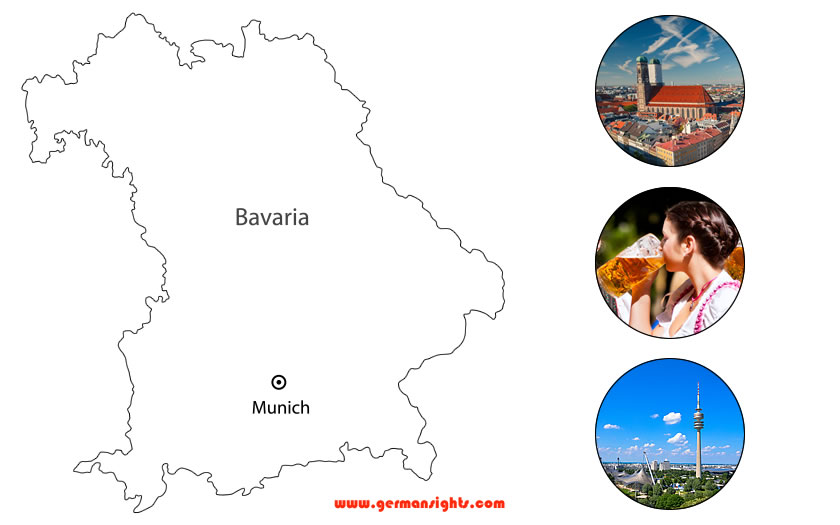
Munich Germany - where is it?
Munich is located on the Isar river, which runs north from the Tyrolean mountains through the city and later joins the river Danube.
The city was founded, like many others, to protect a river crossing (and to collect tolls from the traders who used the bridge and the river). Munich was also granted the rights to the salt trade on the important Salzburg to Augsburg route, which helped increase its prosperity.
Munich became the capital of Bavaria at the beginning of the 16th century, even though the city was less important than the rival settlements of Regensburg and Nuremberg. Slowly though, helped by strong leadership and the increasing influence of Bavaria within the German-speaking part of Europe, Munich grew to prominence.
The city became a centre for arts and culture during the Renaissance period and the Baroque era of the Middle Ages. Many historic city buildings date from these times, including the Frauenkirche and the Munich Residence.
The start of the 19th century and the advent of Napoleon saw the establishment of the Kingdom of Bavaria (instead of the previous Electorate of Bavaria). The French influence led to the dissolution of many religious buildings and the removal of the city walls and development of the city suburbs.
Munich had long been the capital of Bavaria but Munich and Germany have only been together since the late 19th century when Bavaria became part of the German empire. (The unification of Germany - the first one, at least - took place in 1871.)
World War I hit Munich hard. Mass unemployment and political unrest shook Munich with the socialist rebellion being suppressed by the regular troops and right-wing militias from the surrounding countryside.
The reaction to what was effectively a civil war led to the rise of extreme anti-semitic and right-wing groups and Munich became the birthplace of the Nazi Party.
The city was badly damaged in air raids during the war and was deemed to be part of the American sector in the post-war occupation. The fact that Germany had split into two meant that Munich had a much more central position in the south of the country.
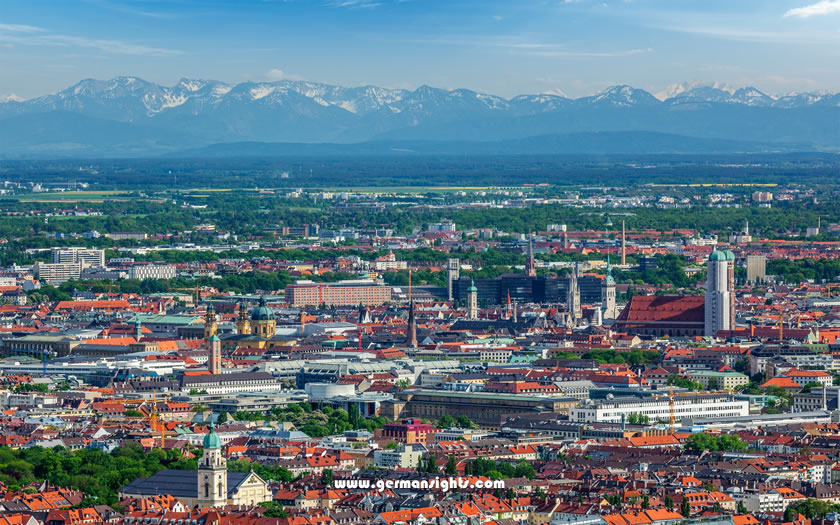
An aerial view of Munich city centre with the Bavarian Alps in the distance
The city boomed in the post-war years and has become an industrial centre and a leading location for theatre, film and publishing.
And it is one of the most popular tourist bases in Germany, with its own famous Munich Oktoberfest and Christmas market and the easy access to the lakes and mountains on the Austrian border.
So take a look at our version of a Munich travel guide. We defy you not to find something of interest in the city!
If you’re flying to Munich, you’ll land at the Munich International Airport, which is 38 kilometres north of the city centre out near the town of Freising. It’s a huge airport with connections to locations around the world. The airport is connected to the city by regular services on the regional S-Bahn train line and by buses.
Find out more about flying to Munich and how to get to the city centre on our more detailed Munich airport page
The only other sensible alternative to Munich is using the much smaller airport at Memmingen, which is popular with low-cost carriers. Memmingen is to the south of Ulm and around 120 kilometres west of Munich.
If you’re taking the train to Munich, you’ll probably arrive at the Munich Central Station ('München Hauptbahnhof'). It’s a busy station that serves 450,000 passengers a day with great high-speed connections to other parts of Germany and neighbouring countries.
Two other train stations in Munich which may be of interest are Munich East ('München Ost'), which has the lively and somewhat trendy Werksviertel area being redeveloped nearby as well as connections to the airport, the east and Austria, and Munich Pasing, with connections to the west, the south and the airport.
Munich bus station is called ZOB München ('Munich Central Bus Station') and is located one S-Bahn stop to the west of the main railway station. Long-distance bus services serve other German cities as well as nearby countries such as Austria, Italy and the Czech Republic.
Munich has a partial ring road of motorways to the west, north and east, which enable drivers to skirt the city centre, as well as an inner ring road, which is usually quite navigable outside rush hours.
Drivers visiting Munich can also avoid the traffic and parking hassle by using one of the Park-and-Ride locations in the suburbs. They are connected to the local public transport, which is fast and reliable.
Starting in the west, the A96 motorway heads towards Lake Constance and the town of Lindau. This is also the motorway connecting Munich to Memmingen Airport.
A little bit further north, the A8 links Stuttgart with Munich, passing Augsburg and Ulm along the way.
The A9 heads north to Ingolstadt and Nuremberg, before branching off to the northeast in the direction of Bayreuth. The A92 junction closer to the city connects to the airport and the town of Freising before following the river Isar towards Landshut and Deggendorf.
The A94 links Munich with the Austrian border at Braunau am Inn, while the A8 runs a little further south passing the Chiemsee before heading towards the city of Salzburg in Austria.
Finally, one of the most popular motorways heads for the south. The first main exit off the A95 is towards the Starnberger See, the haunt of well-to-do commuters and a popular day trip destination on sunny summer days. The motorway finishes just north of Germany's most popular mountain town, Garmisch-Partenkirchen, and is a busy travel route into Austria and, eventually, Italy.
A city the size of Munich has plenty of options when it comes to accommodation. Do you want easy access to the train station or a quiet location near parkland? Somewhere lively in the old town with plenty going on in the evening or a peaceful place where you can go for a pleasant evening wander?
Take a look at our Where to stay in Munich page, which goes into a little more detail about six of the Munich neighbourhoods.
If you know when you are planning to go but haven't decided on accommodation, then use the map below to get an idea of which properties are available and to compare prices during the period you wish to travel.
Enter your proposed dates and use the '+' to zoom in on a location and reveal more properties. Click on the price above a property to see more information.
(Please note that this selection will also include some guesthouses, pensions and self-catering apartments for those who are interested in that form of accommodation!)
Alternatively, if you would like a list of properties available on your proposed dates of travel, use the search box below to find accommodation:
Booking.comBefore you start your adventures in Munich, you should consider getting one of the two official city cards from the local tourist office.
The Munich Card gives you discounts on many of the museums and galleries and, if you want, free travel on either the central area of Munich public transport or the whole of the Munich area (which includes places like Freising, the Starnberger See and Bad Tölz).
The Munich City Pass is like a deluxe version of the Munich Card. It gives you free entry to the sights, free travel (if you want) on the trains and buses as above and, in some cases, fast-track access if there are any lines outside the popular spots.
These passes have been semi-privatised and are available online through TurboPass: www.turbopass.com
You may see advertising for other private initiatives such as the CityTourCard Munich, which also offer their own mix of transport and entry into various sights.
Downtown Munich is easy to walk around, so you can make your own plan and explore Munich at your own speed.
The local public transport authority is called the MVV and runs the bus services and underground trains. They also offer single tickets, day passes and group tickets which vary in price depending on how many zones visitors wish to include in their pass. The English-language version of their website is available here: www.mvv-muenchen.de
Those who are wanting to explore the area around Munich might like to take advantage of some of the local rail cards which are available on the German rail network. The Bayern Ticket covers the whole of Bavaria for a day, while the Werdenfels ticket is a day pass for the area south to Garmisch-Partenkirchen, Mittenwald and Oberammergau.
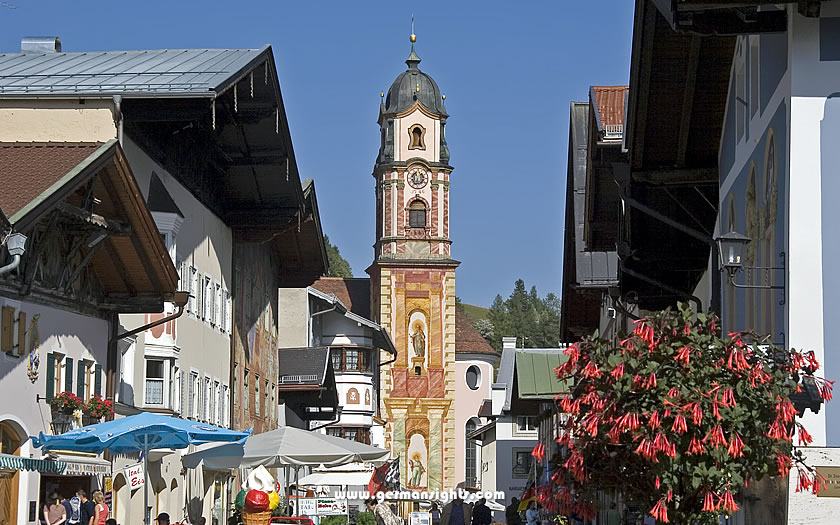
The town of Mittenwald in the Bavarian Alps
Those looking for excursion options outside the city might want to take a look at our page covering suggestions for Day Trips from Munich or the more specialised pages covering the Munich to Salzburg Day Trip and Munich to Innsbruck Day Trip. Anyone looking for something a little more active could visit our Best Hiking Around Munich page.
Munich has so much to offer that it's hard to choose what to do first.
Are you a fan of art? Then you'll love Munich's galleries, which have something for everyone. You can admire the Old Masters at the Alte Pinakothek, or check out the modern design and paintings by 20th century artists at the Museum Brandhorst.
And that's not all. There's a whole area of Munich (the Kunstareal) dedicated to art museums. You could spend hours there!
Are you into history and architecture? Then you'll be fascinated by Munich's buildings and museums, which tell the story of the city and its people.
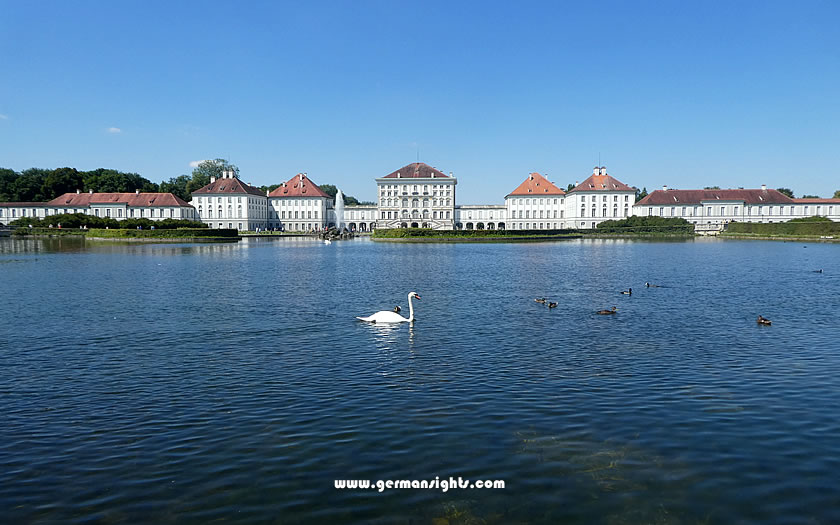
Nymphenburg Palace in Munich
You can visit the former homes of the ruling families, such as Nymphenburg Palace and the Munich Residence, or learn about the local culture and events at the Bavarian National Museum and the Munich City Museum.
And don't forget the Deutsches Museum, the largest science museum in the world. It's a must-see!
All that serious touring around can leave you needing a break. And Munich has you covered there as well with its parklands easily accessible from the city centre.
The English Garden ('Englischer Garten') is the best-known of them. You can sunbathe near one of the lakes, enjoy a reviving snack and drink in the beer garden near the Chinese Tower ('Chinesische Turm') or watch the local surfers on the standing wave in the Eisbach river.
And it would be rude to visit Munich without at least trying one of the beer halls that it is famous for.
Take a look at our Munich Beer and Breweries page for a more detailed look at the 'official' beers of the Bavarian capital.
The most famous (and most tourist-y) experience is at the Hofbräuhaus, but there are also some smaller options which are just as interesting, such as the Wirthaus Ayinger from the Aying family brewery or the Schneider Bräuhaus, famous for its dark wheat beer and real Bavarian cuisine.
The city of Munich is inextricably linked to the Oktoberfest, with the Bavarian beer tents and sideshows, funfairs and food stalls all being set up for the last two weeks in September (and usually a few at the start of October).
The festival on the Theresienwiese attracts an almost unbelievable six million visitors each year.
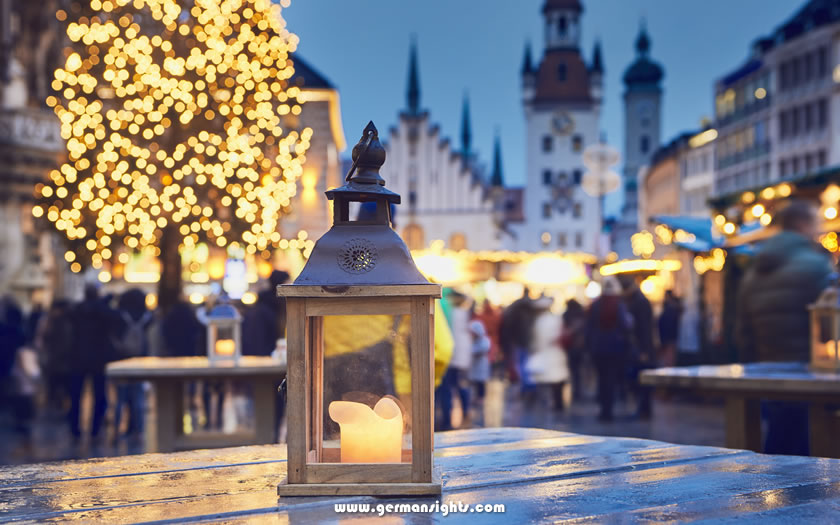
Christmas market on the Marienplatz square in Munich
A rather quieter and maybe more contemplative experience awaits during the Advent period. This is when the Christmas markets set up their stalls. The most famous is the Christkindlmarkt in the old town, but there are plenty of other smaller and less tourist-y markets dotted around the neighbourhoods of the city.
The main Munich tourist office is located in the New Town Hall (Neues Rathaus) in Marienplatz. It can be extremely busy in high season. Another one is located in the main Munich Central Station (München Hauptbahnhof).
Website: www.muenchen.de